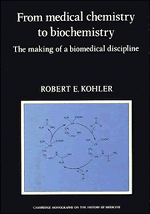Book contents
- Frontmatter
- Contents
- 1 Introduction: On discipline history
- 2 Physiological chemistry in Germany, 1840–1900
- 3 Physiology and British biochemists, 1890–1920
- 4 General biochemistry: the Cambridge school
- 5 European ideals and American realities, 1870–1900
- 6 The reform of medical education in America
- 7 From medical chemistry to biochemistry: the emergence of a discipline
- 8 Unity in diversity: the American Society of Biological Chemists
- 9 The clinical connection: biochemistry as applied science
- 10 Chemical ideals and biochemical practice
- 11 Biological programs
- 12 Epilogue: Toward a molecular biology?
- Location of archival sources and abbreviations
- Notes
- Index
2 - Physiological chemistry in Germany, 1840–1900
Published online by Cambridge University Press: 07 October 2011
- Frontmatter
- Contents
- 1 Introduction: On discipline history
- 2 Physiological chemistry in Germany, 1840–1900
- 3 Physiology and British biochemists, 1890–1920
- 4 General biochemistry: the Cambridge school
- 5 European ideals and American realities, 1870–1900
- 6 The reform of medical education in America
- 7 From medical chemistry to biochemistry: the emergence of a discipline
- 8 Unity in diversity: the American Society of Biological Chemists
- 9 The clinical connection: biochemistry as applied science
- 10 Chemical ideals and biochemical practice
- 11 Biological programs
- 12 Epilogue: Toward a molecular biology?
- Location of archival sources and abbreviations
- Notes
- Index
Summary
As biologists have learned to see species as historical creations, not embodiments of some essential reality, so too must historians learn to think of disciplines as human creations, not subdivisions of a fixed natural order. The scope and thrust of biochemistry were, at crucial points in its history, very much up for grabs; at all times, they were subject to some degree of local interpretation. One must think of biochemistry in two complementary ways: as a body of work in the biomedical aspects of chemistry and as a political or institutional rubric that varies with time and locale. I use the term “biochemistry” to refer to the timeless extended family of biochemistries; when referring to specific historical groups, I use the terms they themselves used: physiological or pathological chemistry, medical chemistry, biological chemistry, and biochemistry, because that term too identifies a group of historical actors. “Biochemistry” has two meanings here, which is awkward, but inescapable.
Most academic disciplines originated in the rather brief period of active institution building in Germany, from 1840 to 1890. In physiological chemistry, as in most fields of science, Germany took a strong and early lead. Yet physiological chemistry was an anomaly; it was not a story of rapid and successful specialization and growth. Germans led in the production of biochemical research; but there were few institutions of physiological chemistry and these had little growth potential.
- Type
- Chapter
- Information
- From Medical Chemistry to BiochemistryThe Making of a Biomedical Discipline, pp. 9 - 39Publisher: Cambridge University PressPrint publication year: 1982



